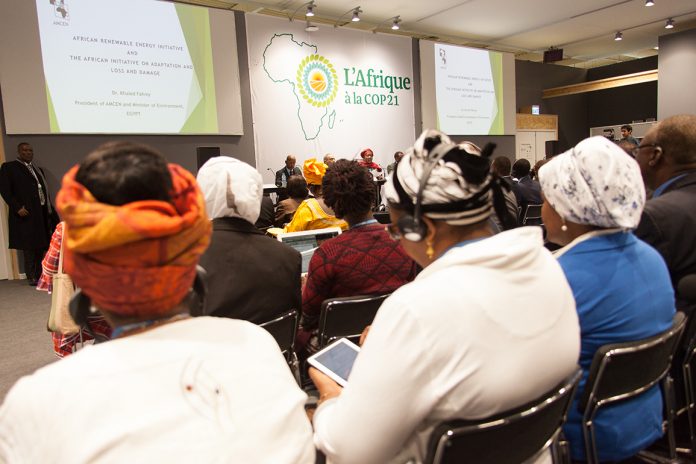Africa sent an unequivocal message of solidarity and unity of purpose at the official opening of the Africa Pavilion at this week’s global talks on climate change in Paris.
Benin’s President Yayi Boni was resolute that the Africa is not at the negotiating table with a begging bowl.
“Africa did not come here to beg for money or assistance but to bring about commitment of all concerned to Africa’s adaptation needs,” he told the audience of high-level officials who were in Paris for the 21st session of the United Nations Framework Convention on Climate Change, also known as COP21.
The adaptation and mitigation needs of the continent are not aid, President Boni said, but an equity issue because climate change is a global phenomenon not caused by Africa.
“The time to act is now…the house is burning,” he said.
In a show of unity and commitment to action, the African delegation used the opening of the Pavilion to present the African Renewable Energy Initiative, a transformative, Africa-owned and Africa-led inclusive effort to accelerate and scale up the harnessing of the continent’s huge renewable energy potential.
Under the mandate of the African Union and endorsed by the Committee of African Heads of State and Government on Climate Change, the initiative is set to achieve at least 10 gigawatts of new and additional renewable energy generation capacity by 2020, and mobilize the African potential to generate at least 300 GW by 2030. It was presented by Khaled Al Fahmy, Ph.D., Egypt’s minister of environment and President of the African Ministerial Conference on the Environment.
According to the African Development Bank, climate change constitutes a major threat to Africa’s development. Climate extremes such as drought, flooding, heat waves and tropical cyclones are intensifying in frequency and intensity. Rising sea levels will threaten the continent’s large coastal population, impacting agriculture, tourism, cities, water levels, health, energy and fisheries, the bank says. COP 21 therefore marks a decisive stage in negotiations of the future international agreement on climate change, it says.
Present at the opening of the Africa Pavilion in Paris were African heads of state and government, parliamentarians and the principals of the four pan-African institutions—the African Union Commission; the African Development Bank; the NEPAD Planning and Coordinating Agency; and the United Nations Economic Commission for Africa.
“Africa’s message for this summit is clear. We need a legally binding agreement with a global governance framework, applicable to all parties, that balances the issues of adaptation, mitigation, provide adequate finance as well as technology development and transfer, declared Nkosazana Dlamini-Zuma, chairperson of the African Union Commission. “The new agreement must commit to reduction of greenhouse emissions to achieve well below 2 degrees Celsius, ensure the principle of common but differentiated responsibility, social justice, and equity, and Africans must speak with one unified voice.”
Dlamini-Zuma noted that Africa development path for the next 50 years, as laid out in the commission’s document, “Agenda 2063: The Africa We Want,” is a sustainable and low carbon path.
“Through Agenda 2063 we want to ensure not only that we mitigate and adapt to climate change, but also do so in a manner that build African capacities, researches, institutions and most importantly—whether it is in agriculture and agro-processing or in renewable energy—to ensure that these initiatives contribute towards development on the continent, creating the much needed livelihoods and jobs for our young people and women”, she emphasized,” she said.
Adesina Akinwumi, president of the African Development Bank, said COP21 can only be considered successful if it meets the needs of our continent.
“Africa is the continent suffering the most from the scotching heat from rising temperatures and droughts have become more frequent and with greater intensity than ever before. Africa needs more money for adaptation. The continent has been short changed by climate change. But we must ensure that it is not short changed by climate finance. AfDB will triple its climate finance to $5 billion a year by 2020,” he said.
Ibrahim Assane Mayaki, Ph.D., CEO of the NEPAD Planning and Coordinating Agency, commended the collaborative approach of the four institutions for providing leadership in setting up the Africa Pavilion and urged the continent’s leaders to continue to advocate for an agreement that reaffirms the obligations of developed countries to provide climate finance that is “additional, predictable and sustainable.”
The agreement must provide for “a continuous assessment of scale of funding needed compared to climate finance available, particularly from public sources, and [must] include a clear burden-sharing process for calculating the contributions to be made by developed country parties,” Mayaki said.
African Development Bank officials contend that renewable energy systems in Africa offer an unprecedented opportunity to accelerate the transition to modern energy services and to increase energy access, with a positive ripple effect on job creation, women empowerment and economic development.
Carlos Lopes, executive secretary of the UN Economic Commission for Africa agreed. However, he said, while Africa is well endowed with all forms of renewable energy resources – hydropower, solar, wind, geothermal, biomass and even marine energy—the total installed electricity capacity in Africa today is only about 160 GW, or just over half of Japan’s installed capacity.
“If we take out North Africa and South Africa, the installed capacity in the rest of Africa is less than that of South Africa. Given the abundant renewable energy resources of Africa, the energy mix of the continent is still dominated by fossil fuels [gas, coal and oil], with renewables making only 22 percent of the installed capacity, dominated by hydropower,” Lopes said.













